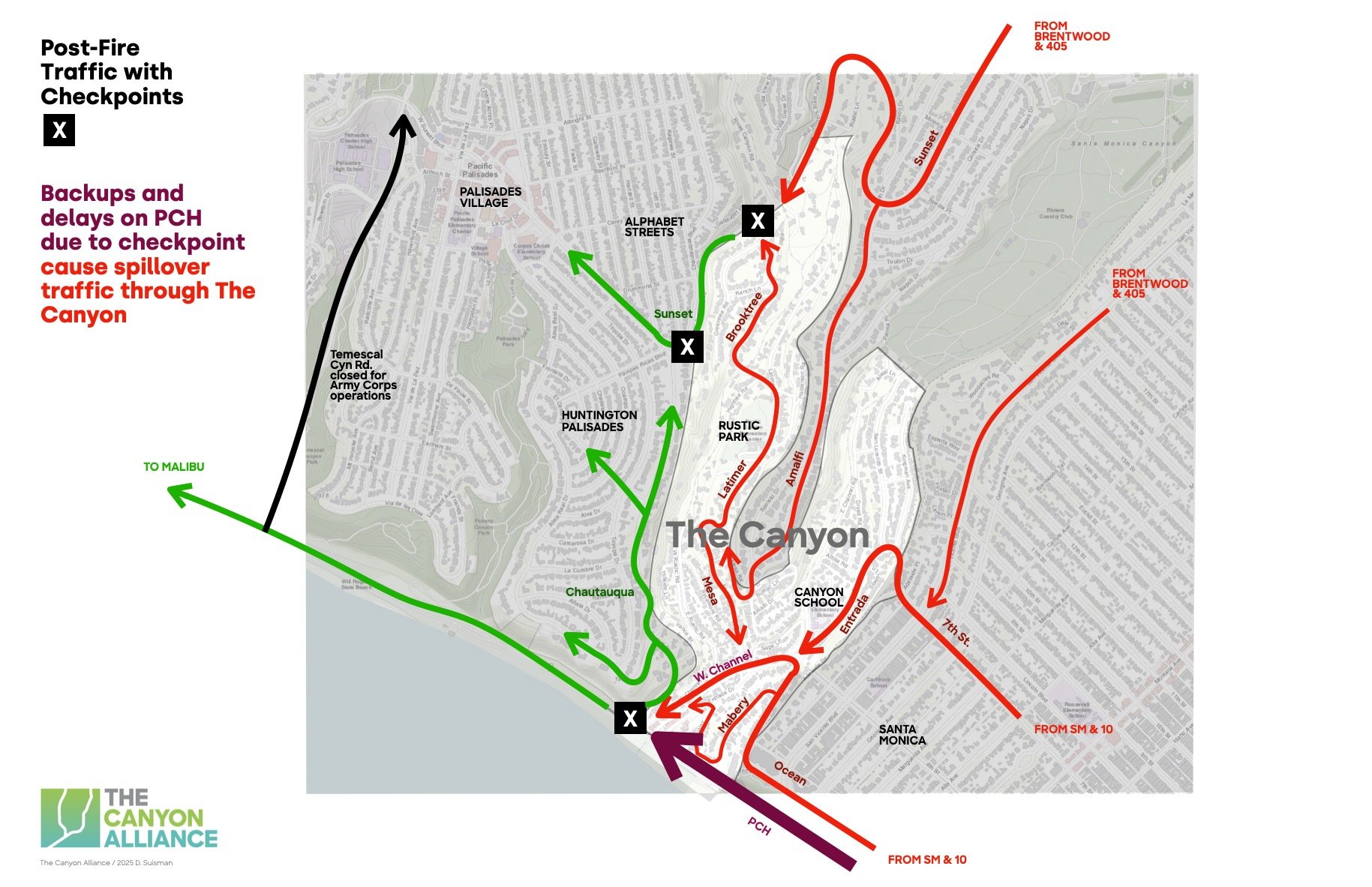Canyon Alliance Works for Traffic Solutions
A multi-agency task force to address myriad Canyon traffic concerns, including checkpoint congestion and heavy trucks on canyon roadways, will be formed this week, according to Doug Suisman, director of the Canyon Alliance.
“Movement of vehicles and material may be one of the most difficult issues in the reconstruction of the Palisades over the coming months and years," Suisman said. “Getting all of this equipment into the Palisades will be a continuing challenge because there are really only three main routes in: Chautauqua, Sunset and Temescal. And Temescal is currently not available due to Army Corps of Engineering recycling operations."
Suisman, who is also a member of the Rebuild Palisades Coalition chaired by Maryam Zar, recently shared details with Zar and other members of the coalition about resulting traffic problems in the Canyon. Morning backups on northbound PCH, due to the checkpoints, can cause delays of up to one hour or more. This has convinced many drivers to avoid PCH and seek alternate routes using neighborhood streets through Santa Monica and Rustic Canyons.
"We support the wishes of the Palisades community for the checkpoints, but officials at Caltrans and elsewhere have to be made aware of the spillover traffic through the Canyon," Suisman said.
It is not only the quantity of vehicles but the size which is causing occasional havoc, Suisman said. Wide concrete trailers and dump trucks sometimes exacerbate traffic when they cannot negotiate turns on narrow Canyon streets, which were not designed to support continuous heavy loads.
The administration at Canyon Charter Elementary School reports students regularly showing up 45 minutes late to class because of reconstruction traffic, Suisman said. A head-on collision occurred last week on Mesa between two trucks involved in reconstruction. In addition, local businesses have been impacted.
“Canyon business and restaurant owners on West Channel are telling me that customers are avoiding the area because of the checkpoints and fears of long delays," Suisman said. "Oversized vehicles sometimes turn two-way streets into one-way traffic, because no one coming from the other direction can get by them. These conditions are obviously not just causing delays and inconvenience, but damage to roadways and sidewalks, while putting motorists and residents in danger because emergency vehicles cannot access those locations."
Suisman asked Zar for assistance at the Coalition's Mar. 18 meeting, and she immediately texted the staff of State Senator Ben Allen, who coordinated a Mar 21 Zoom meeting attended by 22 representatives from 11 agencies.
"It was a remarkable showing, and I want to credit Maryam and Senator Allen's staff, who really made the meeting happen," said Suisman, an architect and urban planner. "After the fire, I think there's an exceptional spirit of cooperation at our public agencies - Federal, State, County, and City. Now we've been able to make them aware that PCH traffic backups are causing harmful traffic spillover in all parts of Santa Monica and Rustic Canyons, and in parts of the Riviera and northern Santa Monica."
Some initial ideas from a variety of sources that Suisman shared at the planning meeting were:
1 Create a "Palisades Traffic" website with precise information on current traffic conditions and checkpoint wait times (similar to a successful site used for the California Incline reconstruction project, led by the City of Santa Monica).
2 Install live video cameras at key locations so that people can view conditions at all times.
3 Design a FasTrak-style permitting system tied to license plates so that registered vehicles could pass through checkpoints without credential checks.
4 Hasten the re-opening of Temescal Canyon Road to relieve Chautauqua and Sunset.
5 Open a second or third lane on Northbound PCH to allow more cars through the checkpoint in the mornings.
6 Install electronic signboards on Sunset in the Riviera and and San Vicente, 70h St., and Ocean Ave. in Santa Monica, stating vehicle size and weight limitations for traffic through the Canyon, and have LAPD enforce this.
7 Provide LAPD traffic control officers during the morning rush hours at critical locations.
8 Promote messaging online and with signage that encourages motorists and contractors to use PCH rather than neighborhood streets during the Palisades reconstruction.
9 Add signage on PCH to better explain lane options.
The point of the task force, said Suisman, is to share ideas like these and brainstorm about the best, most feasible solutions.
The checkpoint that has the most impact on the Canyon is the West Channel/Chautauqua intersection with PCH, but the Brooktree/Sunset checkpoint also is drawing traffic from the 405, Suisman said. Some vehicles are then traveling along Latimer, Mesa, and/or Amalfi as part of their routes. Others are getting stuck on the half-mile Mabery/Ocean Way loop, an especially dangerous situation as there are no outlets.
The task force, which is scheduled to form within a few days, is being set up as a smaller working group within the larger Pacific Coast Highway Task Force, a long- existing multi-agency group that meets regularly to address issues on the state highway, Suisman said. One of the difficulties in combatting gridlock and other traffic issues in the Canyon is the large number of jurisdictions and agencies that must come together to solve problems that cross jurisdictional boundaries.
PCH (State Highway 1) is operated and maintained by Caltrans (California Department of Transportation) and patrolled by the California Highway Patrol, while Canyon streets are operated and maintained by the L.A. Department of Transportation and patrolled by LAPD. In addition, the Santa Monica Department of Transportation and Police Department address problems on that city's streets. The National Guard, which is staffing the traffic checkpoints and the U.S. Army Corps of Engineers, also influence aspects of local traffic operations.
The Pacific Palisades Community Council, which has an existing Traffic Task Force, has been asked be participate.
"We're getting hit from all sides," Suisman said. "There are probably no quick fixes, but there are definitely improvements that can be made if we're all talking to each other."


